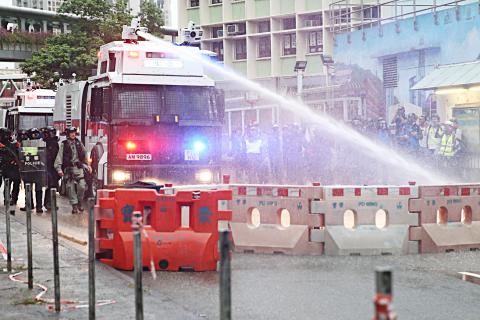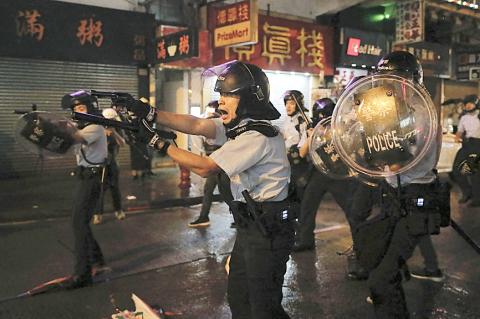Police in Hong Kong yesterday used tear gas to clear pro-democracy demonstrators who had taken over a street and brought out water cannon trucks for the first time in the summer-long protests.
The skirmish on a main drag in the Tsuen Wan district in the New Territories followed a march that ended in a nearby park.
While a large crowd rallied in the park, a group of protesters took over a main street, strewing bamboo poles on the pavement and lining up orange and white traffic barriers and cones to obstruct police.

Photo: EPA-EFE
After hoisting warning flags, police used tear gas to try to disperse the crowd. Protesters responded by throwing bricks and gasoline bombs toward the police.
The result was a surreal scene of small fires and scattered paving bricks on the street between the two sides, before the protesters abandoned their position.
Two water cannon trucks and a phalanx of police vehicles with flashing lights joined riot police on foot as they advanced up the street. They met little resistance.

Photo: AP
Television footage showed a water cannon being fired once, but perhaps more as a test, as it did not appear to reach the protesters.
Later in the evening, a Hong Kong police officer fired at least one gunshot in Tsuen Wan, the first time a live round has been used during three months of protests.
“According to my understanding, just now a gunshot was fired by a colleague... My initial understanding was that it was a uniformed policeman who fired his gun,” a Hong Kong police officer said.
Prior to the skirmishes, tens of thousands of umbrella-carrying protesters marched in the rain.
Many filled Tsuen Wan Park, the endpoint of the rally, chanting, “Fight for freedom, stand with Hong Kong,” the South China Morning Post reported.
The march in the New Territories started near the Kwai Fong train station, which has become a focal point for protesters after police used tear gas there earlier this month. Police with riot gear could be seen moving into position along the march route.
Police yesterday said they arrested 29 people on Saturday for various offenses, including unlawful assembly, possession of offensive weapons and assaulting police officers, after a large group of protesters clashed with police after a march in the Kowloon Bay neighborhood, building barricades and setting fires in the streets.
Ten people were left in hospital after Saturday’s clashes — two in a serious condition — staff said, without detailing if they were police or protesters.
Meanwhile, the territory’s metro system, the MTR, is the latest business to face public censure, after appearing to bend to Chinese state-media attacks accusing the system of being an “exclusive” service to ferry protesters to rallies.
The MTR yesterday shut stations near the main demonstration area in Tsuen Wan, in the second day of station closures in a row.
A second rally of a few hundred, some of them family members of police, yesterday criticized the government for leaving officers to handle the brunt of the crisis, while also calling for an independent investigation into the police handling of the protests.
“I believe within these two months, police have got enough opprobrium,” said a woman who asked not to be named and said she was a police officer’s wife.
“I really want you to know even if the whole world spits on you, we as family members will not. Remember, your job is to serve Hong Kong residents, not be the enemies of Hong Kong,” she said.
Additional reporting by AFP

The CIA has a message for Chinese government officials worried about their place in Chinese President Xi Jinping’s (習近平) government: Come work with us. The agency released two Mandarin-language videos on social media on Thursday inviting disgruntled officials to contact the CIA. The recruitment videos posted on YouTube and X racked up more than 5 million views combined in their first day. The outreach comes as CIA Director John Ratcliffe has vowed to boost the agency’s use of intelligence from human sources and its focus on China, which has recently targeted US officials with its own espionage operations. The videos are “aimed at

STEADFAST FRIEND: The bills encourage increased Taiwan-US engagement and address China’s distortion of UN Resolution 2758 to isolate Taiwan internationally The Presidential Office yesterday thanked the US House of Representatives for unanimously passing two Taiwan-related bills highlighting its solid support for Taiwan’s democracy and global participation, and for deepening bilateral relations. One of the bills, the Taiwan Assurance Implementation Act, requires the US Department of State to periodically review its guidelines for engagement with Taiwan, and report to the US Congress on the guidelines and plans to lift self-imposed limitations on US-Taiwan engagement. The other bill is the Taiwan International Solidarity Act, which clarifies that UN Resolution 2758 does not address the issue of the representation of Taiwan or its people in

US Indo-Pacific Commander Admiral Samuel Paparo on Friday expressed concern over the rate at which China is diversifying its military exercises, the Financial Times (FT) reported on Saturday. “The rates of change on the depth and breadth of their exercises is the one non-linear effect that I’ve seen in the last year that wakes me up at night or keeps me up at night,” Paparo was quoted by FT as saying while attending the annual Sedona Forum at the McCain Institute in Arizona. Paparo also expressed concern over the speed with which China was expanding its military. While the US

SHIFT: Taiwan’s better-than-expected first-quarter GDP and signs of weakness in the US have driven global capital back to emerging markets, the central bank head said The central bank yesterday blamed market speculation for the steep rise in the local currency, and urged exporters and financial institutions to stay calm and stop panic sell-offs to avoid hurting their own profitability. The nation’s top monetary policymaker said that it would step in, if necessary, to maintain order and stability in the foreign exchange market. The remarks came as the NT dollar yesterday closed up NT$0.919 to NT$30.145 against the US dollar in Taipei trading, after rising as high as NT$29.59 in intraday trading. The local currency has surged 5.85 percent against the greenback over the past two sessions, central